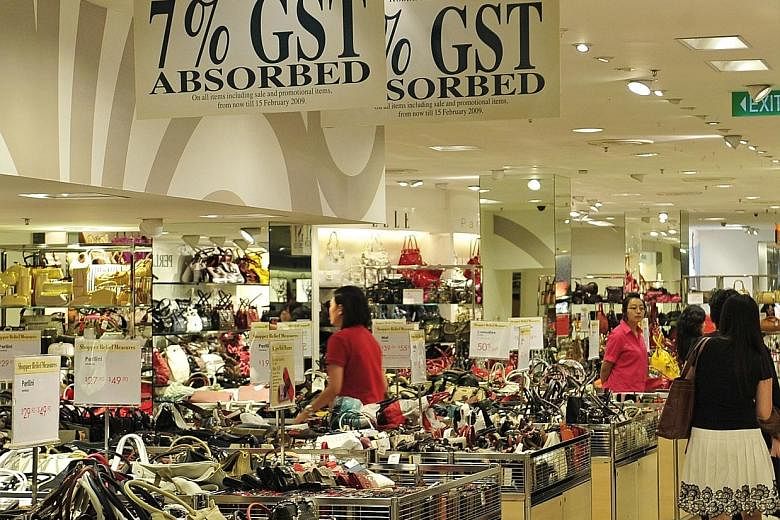The expected hike in the goods and services tax (GST) could push up the cost of living if steps are not taken to mitigate its impact, which will also depend on the size and timing of the increase, economists say.
They added that besides measures to help lower-income households cope, the Government will also have to keep an eye out for companies taking the opportunity to raise prices unreasonably.
Their comments come amid expectations that the GST will be raised within the next few years - possibly as soon as next year's Budget - as demands on the public purse grow. The GST contributed $10.85 billion to government coffers in the 2016 financial year - the second-largest source of tax revenue after corporate income tax.
DBS senior economist Irvin Seah said a staggered GST hike would help smoothen price increases over a few years, while a one-off rise could result in a sharp spike in prices of goods and services.
"The timing is also crucial - if the hike is announced early next year and implemented in the second half, the impact on inflation will be felt more in 2019," he added.
Consumers might also try to pre-empt the GST increase by buying big-ticket items ahead of time, said UOB economist Francis Tan: "This front-loading of bigger purchases could also push prices higher even in the run-up to the GST hike."
While the GST is generally regarded as a regressive tax that hits lower-income households harder than the rich, there will probably be help available to cushion the impact, said Mizuho Bank economist Vishnu Varathan. "We are likely to see more targeted subsidies and offsets. Tools like GST vouchers and rebates can be fine-tuned a lot more."
He also said "signs of profiteering will need to be addressed", to make sure companies keep price hikes reasonable. "Higher GST is a great excuse to raise the price of kopi-O," he noted.
Besides economic considerations, the social and political backdrop of the day could also affect the implementation of the GST hike, said Mr Varathan. "If widening inequality is seen as a pressing issue, the Government might augment the GST increase by classifying luxury and non-luxury goods and taxing them differently."
Ultimately, the timing and size of the GST increase will depend on policymakers' views on the economic outlook, economists said.
The last GST hike, in July 2007, when the rate went from 5 per cent to 7 per cent, coincided with a surge in oil prices, which pushed inflation up even more. Inflation came in at about 1 per cent in 2006 but hit 2.1 per cent in 2007, before soaring to 6.6 per cent in 2008.
"External inflationary pressures remain benign for now, but growth is picking up around the world," said DBS' Mr Seah. "The concern is whether inflation will catch up as well, going into 2018 and 2019."
A higher GST rate could also deter people from spending more and weigh on overall economic growth.
UOB's Mr Tan noted: "It is not clear if next year would be the right time for such moves, especially since we have only just started seeing signs of a pick-up and trade-driven growth has yet to fully spill over into the service sector."
Chia Yan Min

